Corpus Evita
Carlos Franzetti
Libretto by José Luis Moscovich; Concept by Lorenz Russo
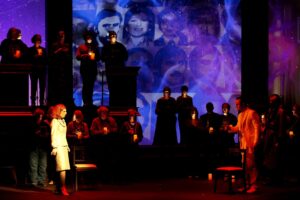
How much responsibility must a person in power assume for acts against humanity that occur because the untested, unprepared leader is either unaware, naïve, or completely incompetent? Is it possible for such a leader ever to seek and receive atonement – especially if the crimes committed result in over 30,000 innocent victims kidnapped, tortured, and murdered?
Such weighty and disturbing questions are the heart of Argentinean composer Carlos Franzetti’s 2005-premiering Corpus Evita, an opera brimming with historical events and iconic figures, black magic, ghosts, and hypothetical ‘what-ifs.’ Based on a concept by Lorenz Russo and with an English libretto by José Luis Moscovich, Corpus Evita rings with a score nominated for a 2005 Grammy that is at one moment haunting and mysterious and in the next boldly grand and cinematic. With a well-voiced cast of six, a resoundingly melodic chorus of twenty-two, and a beautifully polished orchestra of twenty-eight, West Bay Opera stages a compelling, thought-provoking Corpus Evita that raises insightful yet disturbing questions about the lives and long-lasting legacies of leaders globally associated in both fact and myth with Argentina: the Peróns.
With its two acts that span forty years and seven scenes that jump back and forth in time, location, and reality/fantasy, Corpus Evita can at times be a bit confusing while still commanding attention. An opening scene of Evita Perón’s farewell address in 1952 to the adoring masses evokes images of Andrew Lloyd Webber’s Evita while a shift of twenty-two years finds her in a casket with her corpse looking on as her long-dead body is being restored for those same masses to once again see and worship.
The purpose is an attempt in 1974 to connect the fabled second wife, Eva, of the populist-turned-right-leaning Juan Perón with his third wife and widow, Isabel, who is now president, even though she has no political or leadership experience. Due to her deceased husband being influenced during his second rise to power in 1973 by his communist-hating, right-wing Ministro, Isabel is now facing pressure by the same, conniving, power-hungry Ministro to give the country’s generals the approval to attack (and murder) left-leaning protesters. The Ministro uses the black magic he and Isabel practice to seek the advice and approval of Perón’s ghost for this planned action. Soon losing her short-lived role as president and eventually exiling in Spain, Isabel returns in 1992 to Argentina, seeking some peace from her paralyzing guilt over the 30,000 victims and some sense of forgiveness from those who still march in the streets holding photographs of their lost loved ones.
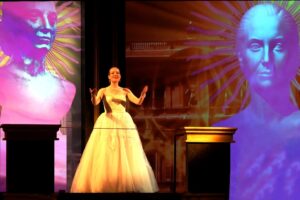
With her familiarly out-stretched arms standing at the plaza’s raised podium and dressed in a sparkling white gown, cancer-stricken Eva Perón sings to her grasitas – her beloved people – her good-bye and promise to be with them forever. With clarion soprano notes that excite and energize both the gathered crowd and us as audience, Jessica Sandidge is fabulously suited in her glowing radiance and in her magnetic vocals to be the mythical Evita who accurately predicts, “When I’m gone … I will live in a million souls.”
Twenty-two years later, a Doctor attempts to restore Eva’s corpse so that the masses can once again see her and hopefully then connect the now, unpopular president, Isabel, to Eva’s legacy. Anders Froelich questions in distinct baritone notes his being asked as a Doctor to disturb “the peace of the dead,”– unfortunately too often in a volume that is lost in the orchestra’s accompaniment.
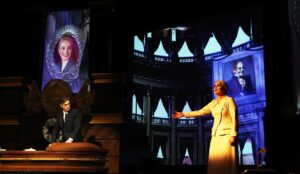
As he works, a ghostly white-faced but noble in stance Corpus Evita appears. Laure de Marcellus employs a rich, reverberating mezzo-soprano voice that rises in rolling waves as Eva’s corpse denounces the Docto’sr efforts to restore a “shrinking, evaporating, wretched thing.” With ever more powerful resolve, her Corpus Evita reminds him that it is the people that keep her alive, not a restored corpse, and that “I am Argentina’s greatest myth.”
But it is the Ministro’s intention that the people now see in Isabel what they once saw – and still see – in Eva. Patrick Bessenbacher electrifies the stage with rapid-fire, bullet-powered notes as he asserts, “Isabel will tell them [the people] what they want to hear … I’ll make sure she does … She will not defy my powers.”
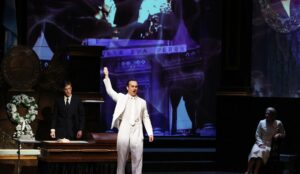
Breaking opera’s convention that the hero/lover is a tenor and the baritone or bass is the villain, composer Carlos Franzetti provides this tenor lead with repeated opportunities throughout the opera’s two hours to pierce the air with magnificently clear and trumpeting vocals that sing of his diabolical plans to manipulate Isabel to do his evil wishes. In a scene where he raises the spirits of Eva and Juan along with an entire ballroom of society’s dancing elites, his sorcery is eerie to behold as it is accompanied by the soul-stirring, affecting voices of the orchestra’s violins, flute, and oboe. Decades later when his spirit is challenged by a regretful, repenting Isabel who now blames him for the many deaths, Patrick Bessenbacher continues to instill vengeful venom into striking notes of tenor as his ghost accuses Isabel, “You were chosen yet you squandered it.” In this production, the despicable villain is indeed a star.
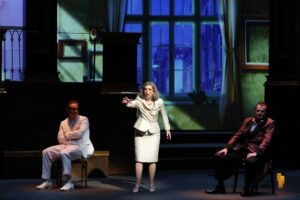
Sara LeMesh is the often-distraught, anguished Isabel who from the moment we first meet her at her presidential desk, appears to be somewhere she does not want to be. With a soprano voice that at first seems hesitant to assert itself as Isabel bemoans, “The people do not like me … I am not Evita,” Sara LeMesh’s Isabel increasingly garners strength in vocals and conviction as the years (and scenes) pass. She particularly shines in the second act as she powerfully punctuates with deeply throated soprano a confrontation with the memories/ghosts of both the Ministro and of her husband, Juan Perón (the richly sonorous bass, Casey Germain). As she comes to terms with her own failures and her own, daily guilt for all those thousands disappeared and lost, she reminds both the ghosts in front of her of their own declines and demises with a voice now stronger than at any time prior in the evening. Her final despair over her own failures is a chilling half-scream, half-cry-of-agony that echoes that of the victims themselves. Much credit goes to Sara LeMesh for a memorable, truly plaintive performance.
The varying locations and settings of the opera as well as the ever-present Peróns – including a number of actual photographs of scenes and people – are displayed on three large backdrops in projections wonderfully created by Peter Crompton, who also has transformed the Lucie Stern Theatre stage into various levels of plazas, platforms, and places populated by the Peróns and their minions. The lighting of Daniele Ferguson plays a large part in repositioning locations and moods as well as shifting scenes from reality to dreams and back again. Finally, Callie Floor has designed a huge array of costumes for the rich and powerful as well as the poor and disenfranchised.
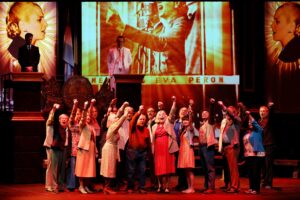
Stage Director José Luis Moscovich (who also masterfully conducts the orchestra) and Chorus Master Bruce Olstad combine their ingenuity and talent to direct the large Chorus as they appear in several roles throughout the evening. In fervent, full harmonies, they are the cherishing crowd who sing their praises of both Juan and especially Eva Peron in the 1952 opening scene. In 1974, they are the passing mourners tearfully reuniting with the refurbished body of the long-dead, now-glass-encased Eva. After the séance of the Ministro, elegantly attired couples waltz around the spirits of the two Peróns while in 1992, the Chorus becomes the Souls of the Disappeared, singing their pain-stricken sadness in notes often purposively discordant and unearthly.
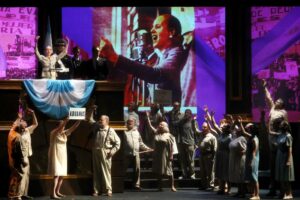
It is this final Chorus that becomes once again the citizens of Argentina, singing in waves of blended melodies to the glistening image of Eva on her raised platform, “Eva is our saint … We love you … Eva is eternal.” In those echoes is the disturbing, underlying message of Corpus Evita. Decade and decade, the legacy of Evita lives on; the people still hope for a populist savior; Argentina is still vulnerable to more reactions by the far right against such hopes. West Bay Opera sends its audience home reveling in the music of Franzetti and mulling over the messages and implications of the libretto by Moscovich.
Rating: 4 E
Corpus Evita continues February 18, 24, and 25, 2024 in performance by West Bay Opera at the Lucie Stern Theatre, 1305 Middlefield Road, Palo Alto, CA. Tickets are available online at https://www.wbopera.org or in person at the box office, Monday – Friday 1:00 – 5:00 p.m., 221 Lambert Avenue, Palo Alto.
Photo Credits: Otak Jump
